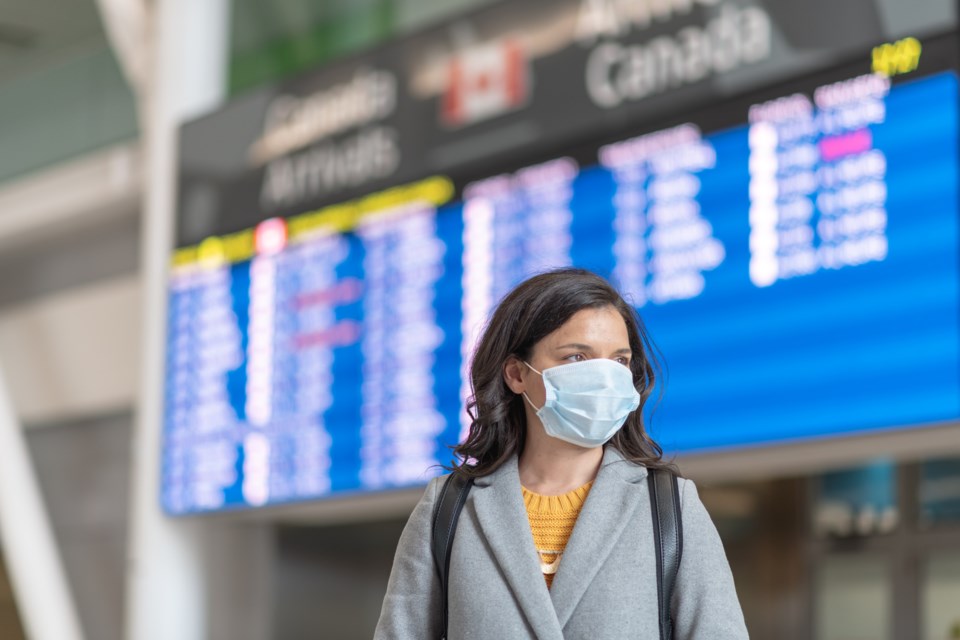On Feb. 15, the federal government announced it would be easing border measures effective Feb. 28 at 12:01 a.m. EST. This article has been updated with details on those changes.
The federal government, and various provincial governments, are moving cautiously toward normalcy with COVID-19. The people MooseJawToday.com spoke with are not quite ready for normal travel.
Until February 28th, the federal government has discouraged any non-essential international travel regardless of vaccination status but after that the Government of Canada will lower its Travel Health Notice from level 3 to level 2, meaning the government will no longer recommend avoiding non-essential travel.
“That’s all we’re doing right now, is travelling within Canada,” said Lesley from Manitoba, who is visiting her mother in Moose Jaw. “I think it’s the coming back that’s the biggest thing. Because I don’t want to be stuck, you know, at my expense, in Mexico. Think I’ll give it another year.”
Lesley said that winter weather has been the cause of most of her hesitancy at travelling between provinces. However, she said her mother is older, and she doesn’t want her to get sick. “We’re doing everything we’re supposed to be doing. If I wasn’t vaccinated, I hope I’d be smart enough not to be visiting.”
Health Minister Jean-Yves Duclos said that the easing of restrictions on Feb. 28 was a “reflection of the progress we have made against this current Omicron variant.” The government is planning to continue easing restrictions in phases to guard against new variants or surges.
People on the streets of Moose Jaw aren’t chomping at the bit, however. “I just don’t know why I would travel right now,” said Marshall, another person who responded to MooseJawToday.com reporter. “I’m fine with waiting, six months or whatever.”
Eric agreed with Marshall. “Either way, it doesn’t feel like the right time, nationally or internationally.” Both said that they would be more likely to travel to a place with a vaccine mandate in place, as they would feel safer there.
After Feb. 28, on-arrival testing for fully-vaccinated travellers will switch to random testing – and you won’t have to quarantine while awaiting results. Children under 12 who travel with fully vaccinated adults will be exempt from quarantine, with no activity limitation.
Unvaccinated Canadian travellers will need to quarantine for 14 days, with tests on arrival and on day eight of quarantine.
With few exemptions, unvaccinated foreign nationals cannot enter the country.
Proof of vaccination must be uploaded to ArriveCAN, available as an app or on the web, with limited exceptions. If you do not use ArriveCAN, you may be refused boarding or debarking, fined, or delayed for medical testing.
To qualify as fully vaccinated, you must:
• have received at least 2 doses of a vaccine accepted for travel, a mix of 2 accepted vaccines
• or at least 1 dose of the Janssen/Johnson & Johnson vaccine
• have received your second dose at least 15 calendar days before you enter Canada
• have no signs or symptoms of COVID-19
“I’d be comfortable travelling,” said Jim from Winnipeg, visiting friends in Moose Jaw. “But I’m not going through all the hassle right now. Even if you do everything they ask, they might test you and quarantine you and I don’t want to deal with that ****.”
Several other people, who declined to give their names, echoed those sentiments. “Travel is hard enough, especially international,” said one woman visiting a downtown gift shop. “Our country makes it hard enough, and then you never know if the place you’re visiting, you know, that place could have an outbreak or… you just never know.”
All travellers five years and older who intend to enter Canada must also provide a recent negative test result. After Feb. 28, either molecular or rapid tests will be accepted – as long as they are officially approved and administered in the country of origin. Home tests are not sufficient.
The government continues to caution that travelling is risky. There is still a risk of contracting COVID-19 – testing positive while abroad might seriously derail vacation plans. Another risk is a potential change to border and travel measures (either Canadian or foreign) during a trip. Announcement of another variant may make getting home more difficult.
“We are committed to a safe reopening,” said Randy Boissonnault, Minister of Tourism. “Let me be clear that the Canadian economy will not fully recover until our tourism sector recovers.”




